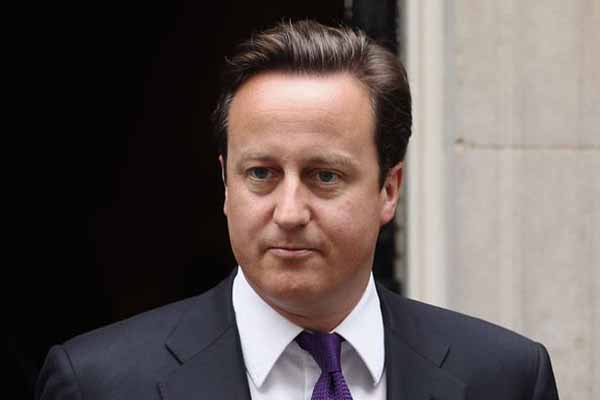The move sets up a parliamentary showdown between rival factions of the Conservative Party in November that could re-open divisions Cameron tried to heal earlier this year. To pacify rebellious eurosceptics in his party and help win back the support of voters lost to anti-EU rivals ahead of a 2015 election, Cameron in May supported draft legislation promising a referendum on EU membership by the end of 2017. But on Sunday, Conservative lawmaker Adam Afriyie said the promise was not enough and put forward his own proposal to bring a vote forward to October 2014. "It's in our national interest to resolve this issue as soon as possible to create the certainty and stability our country needs for the future," Afriyie wrote in the Mail on Sunday. "The fact is, the British people are not convinced there will be a referendum at all if we wait until after the next general election. So many things can change." Cameron's office insisted the proposal would not be allowed to pass.
But the row highlights long-standing party fractures over Europe which contributed to the downfall of former prime ministers Margaret Thatcher and John Major and still pose a risk to Cameron.
The legislation currently under discussion is seen by some as merely symbolic because it could not bind future governments. Afriyie's proposal, which takes the form of an amendment to that draft law, could be debated in parliament on Nov. 8.
Opposition Labour Party spokesman Michael Dugher said the proposal showed Cameron was "too weak and out of touch" to stop infighting in his party.
Afriyie said he had support from some lawmakers in each of Britain's three main parties, but interior minister Theresa May indicated there would be no government backing for his proposal.
"I think Adam has got it wrong, I think we need to be negotiating that settlement with the European Union and putting to the British people the Europe of the future and not the Europe of the past," May told the BBC on Sunday.
Cameron is seeking radical changes to Britain's role in the European Union, which he says has become too bureaucratic and anti-competitive, to win over voters who might be tempted to back the anti-EU UK Independence Party (UKIP).
The Conservatives trailed Labour by five percentage points in poll results published on Sunday. The polls showed UKIP, which has no representatives in the current parliament, on 15 and 13 percent.


 Prime Minister Keir Starmer's 2025 Easter message
Prime Minister Keir Starmer's 2025 Easter message After Nesil Caliskan a by-election will be held in Jubilee ward in Enfield
After Nesil Caliskan a by-election will be held in Jubilee ward in Enfield Publishing the analysis, Labour’s Cllr Ergin Erbil said Everybody in Enfield deserves basic rights
Publishing the analysis, Labour’s Cllr Ergin Erbil said Everybody in Enfield deserves basic rights Gaza-Israel conflict Statement from Cllr Ergin Erbil, Leader of Enfield Council
Gaza-Israel conflict Statement from Cllr Ergin Erbil, Leader of Enfield Council UK AMBASSADOR TO TURKEY VISITS FETHIYE
UK AMBASSADOR TO TURKEY VISITS FETHIYE Journalists from Europe held the Turkish Media Workshop in Skopje
Journalists from Europe held the Turkish Media Workshop in Skopje The European Union called on Turkey to uphold democratic values
The European Union called on Turkey to uphold democratic values Turkish citizens in London said Rights, Law, Justice
Turkish citizens in London said Rights, Law, Justice The 'Prince of Paris' has impressed in his first EuroLeague season
The 'Prince of Paris' has impressed in his first EuroLeague season Saran Media And Euroleague Basketball Extend Media Rights Partnership for Four More Years
Saran Media And Euroleague Basketball Extend Media Rights Partnership for Four More Years Will Rangers be Jose Mourinho’s next victim?
Will Rangers be Jose Mourinho’s next victim? Jose Mourinho's Fenerbahce face Rangers on Thursday
Jose Mourinho's Fenerbahce face Rangers on Thursday Residents welcomed back to Edmonton Leisure Centre
Residents welcomed back to Edmonton Leisure Centre Barclays has become the biggest UK lender so far to cut mortgage rates
Barclays has become the biggest UK lender so far to cut mortgage rates THE SPRING STATEMENT EXPLAINED, UK ECONOMIC OUTLOOK AND GROWTH FORECASTS
THE SPRING STATEMENT EXPLAINED, UK ECONOMIC OUTLOOK AND GROWTH FORECASTS Launch of Made in Enfield gift shop to celebrate local artists and designers
Launch of Made in Enfield gift shop to celebrate local artists and designers
















